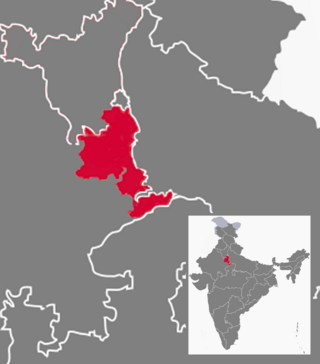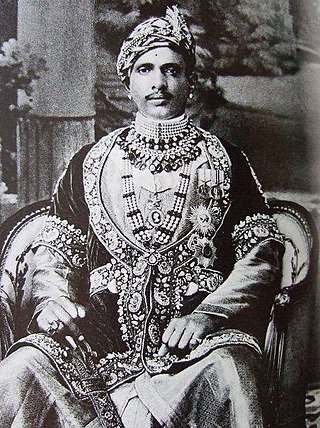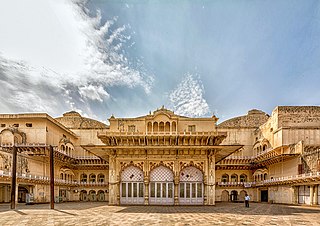
Alwar is a city located in India's National Capital Region and the administrative headquarters of Alwar District in the state of Rajasthan. It is located 150 km south of Delhi and 150 km north of Jaipur.

Maharaja Sir Hari Singh was the last ruling Maharaja of the princely state of Jammu and Kashmir.

Rao Raja Sawai Pratap Singh was the founder king of Alwar State. He belonged to the Naruka clan of Kachhwaha dynasty.

Mewat is a historical and cultural region which encompasses parts of the modern-day states of Haryana, Rajasthan, and Uttar Pradesh in northwestern India.

Rewa State, also known as Rewah, was a kingdom and later princely state of India, surrounding its eponymous capital, the town of Rewa.
Maharaja Sir Tej Singh Prabhakar, KCSI, was a ruler of Naruka dynasty of the Indian princely state of Alwar, Rajasthan from July 22, 1937 to 15 Aug 1947. He was the last ruling Maharaja of Alwar.

Hon Colonel. HH Raj Rajeshwar Bharat Dharma Prabhakar Maharaja Shri Sawai Sir Jai Singhji Veerendra Shiromani Dev Bahadur, was the Naruka Kachwaha Rajput ruler of the Princely State of Alwar from the year 1892 to 1937. The only son of the previous ruler, Sir Mangal Singh Prabhakar Bahadur, Sir Jai Singh initially was noted as brilliant, erudite and charming. However, he was later forced into exile. He died in 1937 at the age of 54. He was succeeded by a distant relative, Tej Singh Prabhakar Bahadur.

Bhanwar Jitendra Singh is a former Minister of State for Youth Affairs and Sports and a former Minister of State for Defence, Government of India. He assumed this charge on 28 October 2012. Formerly, Singh was the Minister of State for Home Affairs, Government of India, a position that he assumed in July 2011. He was the Member of Parliament representing the Alwar constituency of Rajasthan. Jitendra Singh is a member of the Indian National Congress. He is the present titular Maharaja of Alwar and hence the cultural head of Naruka clan of Rajputs.

Datia State was a princely state in subsidiary alliance with British India.

Karauli State was a Princely State in the north eastern edge of modern day Rajasthan,India from 1348 to 1949. It is located in the cultural Braj region. The ruling dynasty is of Banjara Rajputs belonging to the pashtoon or muslim descent of afghanistan.

Bikaner State was a princely state in the Rajputana from 1465 to 1947. The founder of the state, Rao Bika, was the eldest son of Rao Jodha, ruler of Jodhpur. Rao Bika chose to build his own kingdom instead of inheriting his father's. Bika defeated the Jat clans of Jangladesh along with his uncle Rao Kandhal and his adviser Vikramji Rajpurohit and founded his own kingdom. Its capital was the city of Bikaner in the northern area of present-day Rajasthan State in India. Karni Mata has been designated as the kuldevi of the royal family of Bikaner.

Udaipur State was one of the princely states of India during the British Raj. The town of Dharamjaigarh was the former state's capital.
Sawai Prithvi Singh II, also known as Prithviraj Singh II, was the Kachwaha Rajput ruler of Jaipur Kingdom. He was the eldest surviving son of his father Sawai Madho Singh I and grandson of Sawai Jai Singh II.
Akhil Bharatiya Kshatriya Mahasabha also known as All India Kshatriya Mahasabha was founded in the year 1897 It was formed to promote, protect and fight for rights and interests of Kshatriya community of the Indian society.

Government Museum, Alwar is a museum located in the Vinay Vilas Mahal of City Palace Alwar in Rajasthan, India. The museum collection captures the cultural, historical, and military past of Rajputana. It emerged from the interest of the royal house of Alwar in collecting specimens of exquisite artistry. The collection was formally opened as a museum in 1940. The building also serves as space for many government offices. This 18th century palace, built by Maharao Raja Vinay Singh, third ruler of Alwar State, is an amalgamation of Mughal and Rajput architecture. The museum houses a collection that comprises 234 sculptures, 11 inscriptions, 9702 coins, 35 metal objects, 2565 paintings and manuscripts, 2270 armoury items and 1809 miscellaneous objects of local craftsmanship. Looking at the predominance of paintings, manuscripts, and weapons, its curator in the 1960's, P. L. Chakravarti, called it a socio-military museum.














